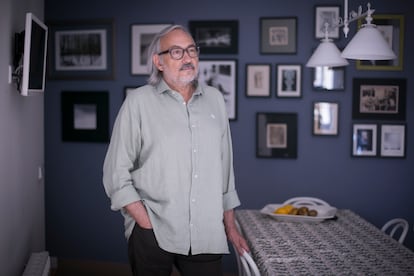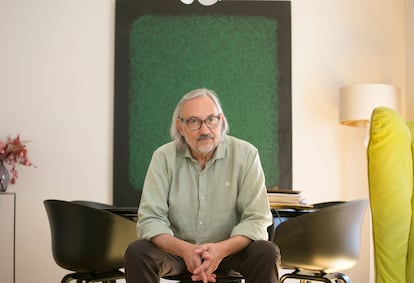In the literary world, writers and books are very visible (at least some) but there is a large scaffolding that usually remains hidden like the thick part of the iceberg. Miguel Munárriz (Gijón, 72 years old) has gone through a good part of this framework: as a cultural manager (organizing meetings and literary awards such as Tigre Juan), journalist, communications director, bookseller or creator of literary agencies (such as Dos Passos, together with Palmira Márquez). He has been part of poetic groups, such as Luna de Abajo. And he was even a door-to-door book seller (although he wasn’t very good at this).
Now he publishes his literary memoirs based on “small anecdotes of great people” collected in Determined to be happy (Aguilar). It is a phrase that Augusto Monterroso said when, at a dinner with Munárriz, they were served a cheese board, a product to which he was addicted. Munárriz has been in many sauces, and as one reads in his book, in many lunches and many dinners.
Ask. Is food the basic form of sociability in literature?
Answer. It is a basic way of relating for humans, especially for Spaniards. In literature, in meetings, fairs and festivals, meals are where a more mocking space, of camaraderie, of friendship opens up.
P. Literature, as seen in his book, is a social act.
R. Yes, beyond reading and writing, which is done in private, it is a social act. For this reason, back in 1987, I began to organize literary meetings in Oviedo with the poets of the Generation of 50 and which ended in 2000 with Manuel Vázquez Montalbán, Manuel Vicent, etc. Every year there are massive meetings at the Campoamor Theater. Every year a theme.
P. Get homesick?
R. Yes, I feel some nostalgia for those times, which were so beautiful. Now it is difficult for me to know which authors are going to pass down to posterity, which is so elusive. Then I was dealing with established writers, who were already in the textbooks, now I don’t feel that there is a generational change.
P. Has the way of talking about literature changed?
R. I think that now literary debates focus too much on the book itself, on this character, on this thing, before they were more open debates, with more substance. I will not mention “commitment” which is too big a word, too old. Or the intellectuals, perhaps because there are almost none of them anymore. The dialogue was much more open.
P. You started as a bookseller in Langreo, Asturias.
R. Yes, I was born in Gijón, my father had been a goalkeeper for Sporting. Then we moved to Tangier, and then, when I was three years old, to Langreo, where my father worked in the Duro Felguera company. The mining area, now in decline, is also a world that has changed a lot. At that time, the steel industry and mining were tremendous, a very demanding world, with many strikes and mobilizations. And cultural life was very important, linked to workers’ organizations, town houses, athenaeums, literary magazines… UNESCO, in 1961, named Langreo the most cultured square kilometer in Europe!
P. How did you get into reading?
R. Something happened to me… The words sounded and made me vibrate. The imagination began to work. Comics, Enid Blyton books, going to the library with friends, which fascinated me. He had a reader’s intuition: he always chose good books. There were no books in my house, but they started coming in when I became a member of the Readers’ Circle. Books are something that has made me: we are what we eat and what we read. How can there be a life without reading?
P. And then you started organizing things. For that you have to have a lot of courage.
R. I just had to tell everything: there are people who don’t communicate what they read, but I have always felt the need to recommend books, to leave them. That reading was a continuous current, that we were all in the same reading boat.
Books are something that has made me: we are what we eat and what we read. How can there be a life without reading?
P. They say that the publishing industry happens between someone who writes in their pajamas and someone who reads in their pajamas. You’ve been in almost every position between those two pajamas.
R. I have been in pajamas, many times I have put on jeans and sometimes also a suit, it depends on where I had to go. The good thing about having held so many positions is that I know what everyone in this union suffers and what they enjoy. And I find it interesting that these trades are becoming known, it is a complex and broad world.
P. The poet Ángel González is one of the first and most important writers he has dealt with.
R. Ángel González was very important since I met him in 1984. We wrote a tribute book to him from the group of poets Luna de Abajo, of which I was a part. From there it was a continuous knowledge. He was a man of friends; of night owl friends.
P. He is an author who likes you when you read him, but who, they say, liked him almost better in person. They called him “civil saint”…
R. That “saint for civility” comes from a song by Joaquín Sabina (in the song minus two wings). And he is very well described: you admired Ángel for his work, but then he did not disappoint you in person. I have been lucky with the writers I have dealt with because they have not disappointed me.

P. Their fabada has not disappointed either. For example, Mario Vargas Llosa.
R. One day I told him that he had to try my fabada. He had tried the Litoral fabada, from a can, which, mind you, is not bad at all. So he invited me to his house to cook. He came down every bit from his studio: “How that smells!” In the end we ate it with friends… and I had to leave the pot: I wanted to eat the leftovers the next day!
P. Juan Cueto is another usual suspect in your book. Not so well known to the general public, but highly respected in the world.
R. Just for having created the magazine The northern notebooks He already deserves a passport to glory. He was a man of great modernity, a worldly philosopher, very interesting, a communicator who was always ahead. Ahead of his time. And he happens like he does with other writers in the book: very cultured people, very interesting, but very funny and very friendly. I believe that Cueto is not as well known as others because he has a lot of published work, but not a great work, a novel, an essay, for which he will be remembered.
P. We cannot finish without mentioning Paco Umbral, whom I interviewed on several occasions. And you appeared in one of his columns, as “the young Munárriz.”
R. Yes, and he was not that young, he was already forty when I visited him. He was the star columnist of The world, where I went to work. I did a wonderful interview with him, sitting in that wonderful wicker chair, so characteristic. He was a teacher of journalists, a special being, a being hurt by the circumstances of his life, the death of his son. He fought against everything to make a place for himself as a “newspaper writer,” as he called it.
P. What is not left are those media writers, Cela, Umbral, Arrabal, who went on TV to play tricks.
R. They were perfect communicators of themselves, experts in marketing their character. Because they were characters. You have to have a big ego to do that. All writers have it, some just show it more than others.
Subscribe to continue reading
Read without limits
_

